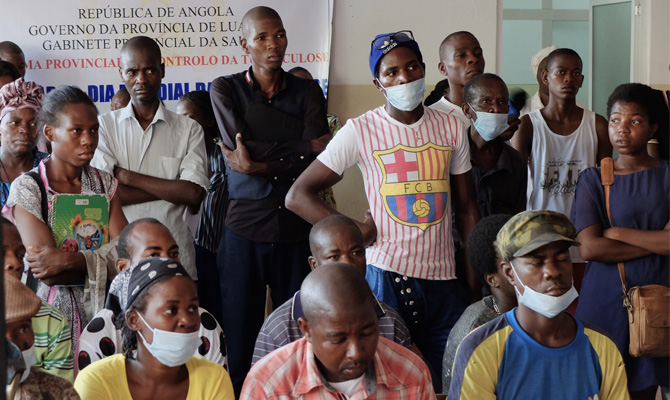World TB Day 2016 Cuamm in the front line in the fight against TB, responds to WHO’s appeal
On occasion of World TB Day on 24 March, the World Health Organization (WHO) has called on countries and partners to “unite to end tuberculosis”. Doctors with Africa Cuamm gladly accepts the challenge, and will continue to be among those working in the front line to end tuberculosis in Africa by 2030.

On occasion of World TB Day on 24 March, the World Health Organization (WHO) has called on countries and partners to “unite to end tuberculosis”. Doctors with Africa CUAMM gladly accepts the challenge, and will continue to be among those working in the front line to end tuberculosis in Africa by 2030.
«In 2015 in the 18 hospitals where CUAMM is active in Africa, some 10,000 people underwent screening for tuberculosis; around 2,500 patients were confirmed positive, 1,000 of whom were found to be putting the communities they lived in at risk for contagion». Don Dante Carraro, director of Doctors with Africa CUAMM, continues: «What we’re doing here is but a drop in the sea, but where we work, in the areas of greatest need, finding and treating tuberculosis patients in the appropriate manner can make an important difference».
Dr. Mario Raviglione, director of the WHO’s Global TB Programme, appreciates CUAMM’s commitment in this area:
«Doctors with Africa CUAMM is doing very important work in the fight against TB. They’ve made the guidelines of our “Stop TB Strategy”, whose goal is to put an end to the worldwide spread of the disease, an integral part of their own programmes. Now we have to end this disease for good by 2030».
«This is why we at the Global TB Programme have elaborated our End TB Strategy guidelines, which I hope can be adopted and integrated 100% into all of Doctors with Africa CUAMM’s activities in Africa. In fact, the principles underlying our strategy can also be found in CUAMM’s DNA and mission: ensuring access to health care for the most vulnerable and marginalised communities and working to promote the sustainable development of health care resources».
According to Dr. Raviglione, who is also a member of Doctors with Africa CUAMM’s Board of Directors, the organisation is clearly on the right track.
«In Ethiopia, which I visited in November 2015 as part of my work with WHO, Doctors with Africa CUAMM’s commitment to tackle tuberculosis is crystal clear. But there’s still plenty more to be done, through new projects and in other countries, working together for the health and well-being of communities».
It is with the support of the World Health Organisation, in fact, that Doctors with Africa CUAMM has been able to launch a project in Ethiopia for providing and measuring preventive health care for children under the age of 5 and HIV-affected individuals traced among the family members and neighbours of TB patients. The aim of the project, which identifies the “chain” of contacts that a TB-infected individual has had, is to tackle the disease promptly, working to combat and prevent it especially in the two most at-risk groups, young children and HIV-positive individuals.
In fact while tuberculosis, together with HIV/AIDS, is the infection that causes the greatest number of deaths worldwide, in Africa the two diseases converge in an extremely dangerous way. Let’s hear what Dr. Raviglione has to say about TB-HIV co-infection:
«75% of the world’s cases of HIV/AIDS-associated TB are found in Africa and a third of AIDS-related deaths is caused by the onset of HIV-associated TB. These numbers make clear the need to integrate programs tackling the two diseases, in order to make treatment for both more effective».
CUAMM’s commitment to tackle tuberculosis
Among the countries where CUAMM is active with health care projects, Ethiopia, Mozambique and Tanzania are three of the twenty worldwide with the highest number of registered cases of TB (WHO data). Angola and Sierra Leone are among the ten countries with the highest TB incidence rates in the population.
CUAMM has already begun projects to tackle TB in some of these countries:
- in Ethiopia, in Wolisso, for example, we do contact tracing starting from the patients we treat, and make quick and accurate diagnoses using the GeneXpert system;
- we use the same system in Uganda, in the MatanyHospital;
- in Angola, Doctors with Africa CUAMM acts as a consultant to the government in its national strategic plan for TB control activities, financed by the Global Fund. In partnership with the World Diabetes Foundation, CUAMM is also carrying out an innovative research project in Angola whose aim is to diagnose individuals being treated for TB who are also affected by diabetes.
In the other countries where we are active (Mozambique, Tanzania, Sierra Leone and South Sudan), Doctors with Africa CUAMM works in the hospitals where it is present to diagnose and treat TB in line with each of those countries’ strategic plans.
Join us
Join our efforts
Charity gifts
Go to the Italian website to choose your gadget.